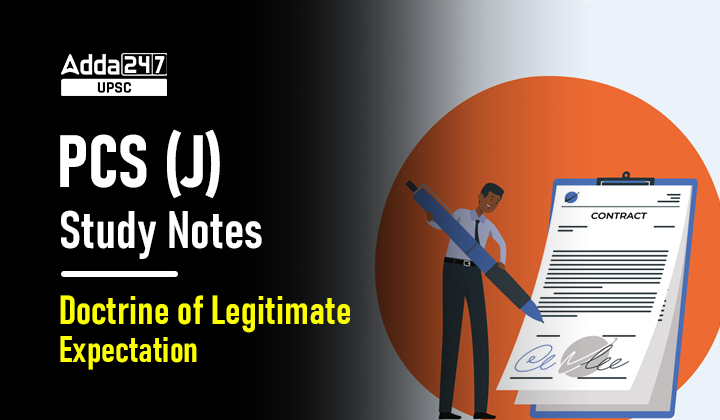Table of Contents
Doctrine of Legitimate Expectation
As a result of historical practise or an express commitment made by the relevant authority, a person may have a legitimate expectation of being treated in a particular way by administrative authorities. Legal theory that holds a government agency liable where no reasonable remedy exists. Therefore, the interaction between a private citizen and a government agency is at the heart of the Legitimate Expectation doctrine.
In the first Indian case to address the legitimate expectation doctrine, State of Kerala v. K.G. Madhavan Pillai ((1988) 4 SCC 669), the Supreme Court of India ruled that a plaintiff had a right to sue for breach of contract. In this case, the respondents were given permission to open a new aided school and improve the current ones, but that permission was put on hold 15 days later by an Order. The Respondents filed an appeal of this Order on the grounds that it violated their rights to due process of law. The Supreme Court concluded that Respondents had a legitimate expectation of protection under the sanction, and that the second order was contrary to natural justice.
The doctrine cannot be applied on ambiguous, illogical, invalid, or irrational reasons, therefore keep that in mind if you plan to make an argument based on such grounds. In order to rely on this doctrine, there must be either an express guarantee from the administrative power or a longstanding practise. In the case Madras City Wine Merchants Association v. State of Tamil Nadu, a similar remark was made. It was decided in the light of the circumstances of the case that a claimant may argue on the basis of this doctrine “if an express promise has been held out or some kind of representation has been made by a public authority, provided that such a promise or representation is not vague, unclear, and unambiguous, or if there exists a past practise (established practise) which the claimant can reasonably expect to be followed in his case as well”.
More importantly, this expectation must hold reasonability under all circumstances. A person may have a legitimate expectation of being treated in a specific manner by an administrative authority even if they have no legal right but are affected or likely to be affected by the order passed by a public authority under the notion of legitimate expectation. Considering the importance this doctrine places on concepts like “express or explicit promise” and “established or regular practise,” it’s important to learn more about these concepts and how they’re used in this doctrine.
वैध अपेक्षा का सिद्धांत
ऐतिहासिक अभ्यास या संबंधित प्राधिकरण द्वारा की गई एक स्पष्ट प्रतिबद्धता के परिणामस्वरूप, एक व्यक्ति को प्रशासनिक अधिकारियों द्वारा एक विशेष तरीके से व्यवहार किए जाने की वैध अपेक्षा हो सकती है। कानूनी सिद्धांत जो एक सरकारी एजेंसी को उत्तरदायी ठहराता है जहां कोई उचित उपाय मौजूद नहीं है। इसलिए, एक निजी नागरिक और एक सरकारी एजेंसी के बीच बातचीत वैध अपेक्षा सिद्धांत के केंद्र में है।
वैध अपेक्षा सिद्धांत को संबोधित करने वाले पहले भारतीय मामले में, केरल राज्य बनाम के.जी. माधवन पिल्लई ((1988) 4 एससीसी 669), भारत के सर्वोच्च न्यायालय ने फैसला सुनाया कि एक वादी को अनुबंध के उल्लंघन के लिए मुकदमा करने का अधिकार था। इस मामले में, उत्तरदाताओं को एक नया सहायता प्राप्त स्कूल खोलने और वर्तमान में सुधार करने की अनुमति दी गई थी, लेकिन 15 दिन बाद एक आदेश द्वारा उस अनुमति को रोक दिया गया था। प्रतिवादियों ने इस आदेश की अपील इस आधार पर दायर की कि इसने कानून की उचित प्रक्रिया के उनके अधिकारों का उल्लंघन किया है। सुप्रीम कोर्ट ने निष्कर्ष निकाला कि प्रतिवादियों को मंजूरी के तहत सुरक्षा की एक वैध उम्मीद थी, और दूसरा आदेश प्राकृतिक न्याय के विपरीत था।
सिद्धांत को अस्पष्ट, अतार्किक, अमान्य या तर्कहीन कारणों पर लागू नहीं किया जा सकता है, इसलिए यदि आप ऐसे आधारों पर तर्क करने की योजना बनाते हैं तो इसे ध्यान में रखें। इस सिद्धांत पर भरोसा करने के लिए, या तो प्रशासनिक शक्ति से स्पष्ट गारंटी होनी चाहिए या लंबे समय से चली आ रही प्रथा। मद्रास सिटी वाइन मर्चेंट एसोसिएशन बनाम तमिलनाडु राज्य के मामले में भी इसी तरह की टिप्पणी की गई थी। मामले की परिस्थितियों के आलोक में यह निर्णय लिया गया कि एक दावेदार इस सिद्धांत के आधार पर तर्क दे सकता है “यदि एक स्पष्ट वादा किया गया है या किसी सार्वजनिक प्राधिकरण द्वारा किसी प्रकार का प्रतिनिधित्व किया गया है, बशर्ते कि ऐसा वादा या प्रतिनिधित्व अस्पष्ट, अस्पष्ट और असंदिग्ध नहीं है, या यदि कोई पिछली प्रथा (स्थापित अभ्यास) मौजूद है, जिसे दावेदार उचित रूप से अपने मामले में भी पालन करने की उम्मीद कर सकता है”।
इससे भी महत्वपूर्ण बात यह है कि यह अपेक्षा सभी परिस्थितियों में तर्कसंगत होनी चाहिए। एक व्यक्ति को एक प्रशासनिक प्राधिकरण द्वारा एक विशिष्ट तरीके से व्यवहार करने की वैध उम्मीद हो सकती है, भले ही उनके पास कोई कानूनी अधिकार न हो, लेकिन वैध अपेक्षा की धारणा के तहत एक सार्वजनिक प्राधिकरण द्वारा पारित आदेश से प्रभावित या प्रभावित होने की संभावना है। “व्यक्त या स्पष्ट वादा” और “स्थापित या नियमित अभ्यास” जैसी अवधारणाओं पर इस सिद्धांत के महत्व को ध्यान में रखते हुए, इन अवधारणाओं के बारे में और इस सिद्धांत में उनका उपयोग कैसे किया जाता है, इसके बारे में अधिक जानना महत्वपूर्ण है।



 TSPSC Group 1 Question Paper 2024, Downl...
TSPSC Group 1 Question Paper 2024, Downl...
 TSPSC Group 1 Answer key 2024 Out, Downl...
TSPSC Group 1 Answer key 2024 Out, Downl...
 UPSC Prelims 2024 Question Paper, Downlo...
UPSC Prelims 2024 Question Paper, Downlo...





